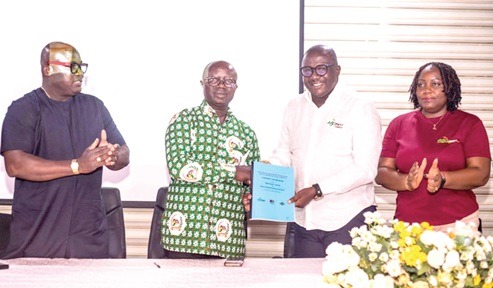The National Service Secretariat (NSS) and an agribusiness management consulting firm, Agri-Impact Consult, have signed a memorandum of understanding (MoU) to create jobs in agriculture for about 90,000 tertiary graduates.
Under the initiative dubbed:“ Harnessing agricultural productivity and prosperity for youth (HAPPY),” fresh tertiary graduates will be posted to farms facilitated by the consulting firm across the country to undertake their mandatory one-year service to the nation.
It was signed by the Executive Director of NSS, Osei Assibey Antwi, and the CEO of Agri-Impact Consult, Daniel Fahene Acquaye in Accra.
Annually, tertiary institutions produce more than 100,000 graduates and studies indicate that it could take up to 10 years for some youth to secure stable jobs.
The agreement, therefore, would help tackle youth unemployment by modernising and making agriculture more attractive to them while contributing immensely to the nation’s food security.
The agreement, which spans four years, is funded by Mastercard Foundation, the social arm of Mastercard, a US-based payment network processing company interested in advancing education and financial inclusion to catalyse prosperity in developing countries.
Initiative
Mr Acquaye further said that the agreement was part of a larger initiative to create jobs for 326,000 young people in the country in four agricultural value chains — rice, soya, tomatoes and poultry.
“The project has been designed to be implemented by eight partners, of which NSS is one of the major partners,” he added.
The CEO said the initiative had a target to increase food production by 189,000 tonnes along the crop value chain, including 12,000 tonnes of poultry, adding that by the end of the four years, it is expected to generate over $200 million in the form of import substitution.
“I am happy to see all the regional directors here because the job creation along the value chain will not only be in Accra and Kumasi and other urban areas, but the rural youth would also benefit from opportunities in agriculture,” he said.
Significance
Mr Antwi said engaging the graduate youth was the safest bet to increase food production and make the country food secure while creating jobs and improving livelihoods in the country.
“We are now in an era where you can be in the comfort of your office, yet can get your farm irrigated.
We are in an era where machines can be commanded to go into the farm and start work, robotics,” he said.
Mr Antwi also said that when the project began, the NSS would consider integrating non-graduates who were passionate about agriculture to ensure they also had a fair chance to transform their lives economically, while helping in the development of the country.
He, therefore, charged the regional directors to help secure well documented lands in their respective jurisdictions for a smooth implementation of the initiative.


